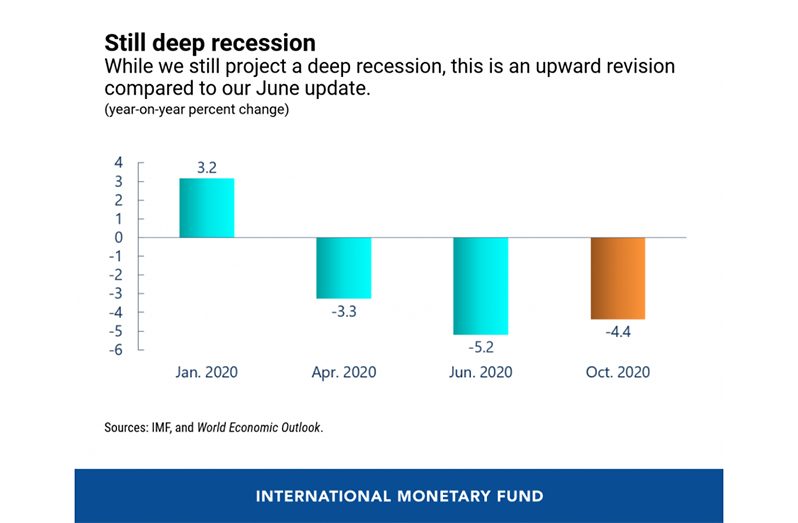-only country in Caribbean & Latin America with positive growth
GUYANA is the only country in the Caribbean and Latin America region projected to have positive real Gross Domestic Product (GDP) growth, pegged at 26.2 per cent, in spite of the ramifications of the COVID-19 pandemic, according to the International Monetary Fund (IMF).
The World Economic Outlook Report (WEO), published by the IMF and released this month, states that Guyana’s GDP is expected to grow by 26. 2 per cent for 2020. Additionally, this report also projects that Guyana’s economy will grow by 8.1 per cent in 2021. In 2019, Guyana’s real GDP grew by 5.4 per cent.
The Real GDP is an inflation-adjusted measure that reflects the value of all goods and services produced by an economy (in this case, Guyana’s economy) in a given year. In simpler terms, the real GDP measures a country’s total economic output, adjusted for price changes.
In April, Guyana’s economy was projected to grow by 52.8 per cent, a revision to the pre-pandemic 86 per cent growth projection. That revision came about as a result of the less-than-usual global demand for oil due to pandemic and the oil-price war between Russia and Saudia Arabia.
Guyana’s growth is largely attributed to its nascent oil and gas sector. Vice-President, Bharrat Jagdeo at a pre-budget press conference in August said that Guyana’s oil economy grew by 45.9 per cent, but the non-oil economy, which comprises the traditional, labour-intensive sectors, shrunk by 4.9 per cent in the first half of the year.
Though Guyana’s 26.2 percent is lower than the previous GDP growth projections for Guyana, the country is the only nation in the Caribbean and Latin America which is projected to record positive growth, despite the wide-reaching impact of the COVID-19 pandemic.
The entire Caribbean and Latin America region is projected to grow by -8.1 per cent, but this contraction is an upward revision of the previous projection of -9.4 per cent in June.
Caribbean countries have been particularly hard-hit by the pandemic as the tourism sector, the main income earner for these countries, has been devastated. Major travel restrictions have been imposed worldwide to mitigate the spread of the novel coronavirus, and many Caribbean countries have been cautiously reopening their borders.
This October WEO states that global growth is projected to be -4.4 per cent, a negative figure but also an 0.8 per cent upward revision compared to the projected figures released in the June WEO.
“This upgrade owes to somewhat less dire outcomes in the second quarter, as well as signs of a stronger recovery in the third quarter, offset partly by downgrades in some emerging and developing economies,” the IMF noted.
Global growth in 2021 is projected to rebound to 5.2 per cent, but this is 0.2 per cent below the June projection.
Currently, the global health sector has been working expeditiously towards developing a COVID-19 vaccine. It is estimated that if medical solutions can be made widely available at a faster rate, all economies could potentially benefit from a cumulative increase in their income. At a press briefing following the release of the October report, the IMF’s Chief Economist and Director of the Research Department, Gita Gopinath, stressed that good management of local economies is now more crucial than ever.
“Policies must focus aggressively on limiting persistent economic damage from this crisis. Governments should continue to provide income support to households and work to (prevent) rising bankruptcies and job destruction through supporting vulnerable but viable firms,” she said.
Speaking on the post-pandemic recovery trajectory, she said that policies should shift towards facilitating a reallocation of resources towards growing sectors such as e-commerce. Focus should also be on green and sustainable development.
Emerging markets and developing economies, like those in the Caribbean and Latin America region, were also a cause for concern for Gopinath. She said that while these countries have to deal with the COVID-19 pandemic and its ramifications with far fewer resources, they will need continued support in the form of international grants, concessional aid, and in several cases, debt relief.




.png)









